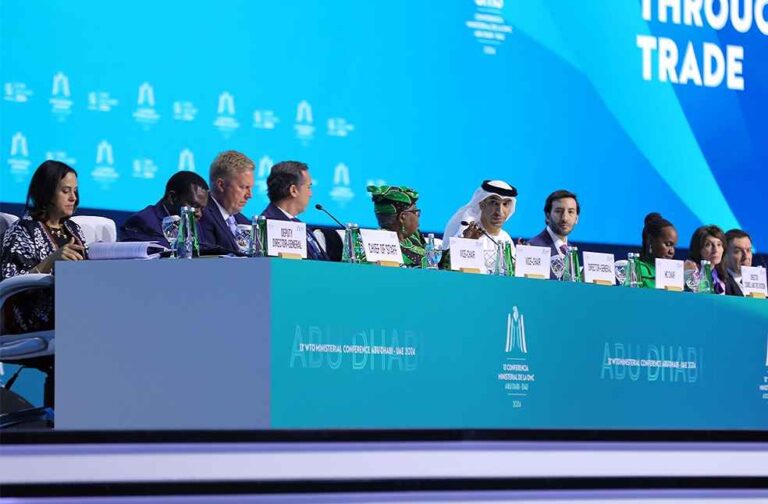The World Trade Organization’s (WTO) 13th Ministerial Conference (MC13) commenced with notable anticipation yesterday, marking a significant assembly of international delegates in Abu Dhabi, United Arab Emirates. This gathering serves as a fulcrum for discussions spanning the spectrum of global trade issues, merging traditional commerce practices with the burgeoning sphere of the digital economy.
Ambassador Athaliah Lesiba, steering the conference as Chairperson of the WTO General Council, presented a detailed report showcasing strides achieved since the preceding convening. Emphasis was placed on enhanced trade review mechanisms and progress in negotiations concerning pivotal areas such as fisheries subsidies and e-commerce, delineating the ongoing evolution of global trade frameworks.

This edition of the conference also signals a crucial phase in expanding WTO’s membership, with Comoros and Timor-Leste on the brink of integration into the global trading system, symbolizing a significant milestone in their economic narratives.
Discussions around the MC13 Ministerial Declaration saw member states grappling with a draft document, aiming for a consensus that would reflect the collective ambition of the WTO’s membership. This endeavor, despite its complexities, underscores a collective commitment to crystallize a declaration reflective of the WTO’s ambitions.
The spotlight on the Work Program on Electronic Commerce captures the essence of digital trade’s escalating relevance within the global economy. The quest for a unified stance on the draft ministerial decision underscores the complexities of navigating digital trade policies

A consortium representing the semiconductor industry globally has positioned the 13th Ministerial Conference as a critical juncture for India, urging a reevaluation of its stance on duties for cross-border digital e-commerce. This appeal underscores the nuanced challenge of synchronizing national policies with global trade norms.
Director-General Ngozi Okonjo-Iweala’s announcement of a $50 million initiative to fortify female entrepreneurs in developing nations encapsulates the WTO’s dedication to fostering inclusive economic growth. Commendations for the UAE’s open trade policies and developmental support underscore optimism for the conference’s outcome, despite prevailing global uncertainties.
From India’s vantage point, the conference underscores a strategic inflection. Articulated at the Raisina Dialogue in New Delhi, the Union Minister of Commerce and Industries underscored a meticulous approach to trade negotiations, reflective of the enduring impacts of Free Trade Agreements.

India’s advocacy for the WTO to adhere to its foundational principles and address emergent concerns, such as the European Union’s Carbon Border Adjustment Mechanism and the advocacy for a moratorium on fishing subsidies, highlights a protective stance for local ecosystems against overfishing.
As deliberations at the WTO’s 13th Ministerial Conference unfold, the path to a cohesive global trade policy navigates through intricate challenges. Yet, the collective resolve of member states and the introduction of forward-thinking initiatives signal an optimistic trajectory for global trade, characterized by an equitable, sustainable, and digitally integrated future.
DON’T MISS IT | WTO Launches IFD Agreement to Elevate Global Trade, Investment Growth



